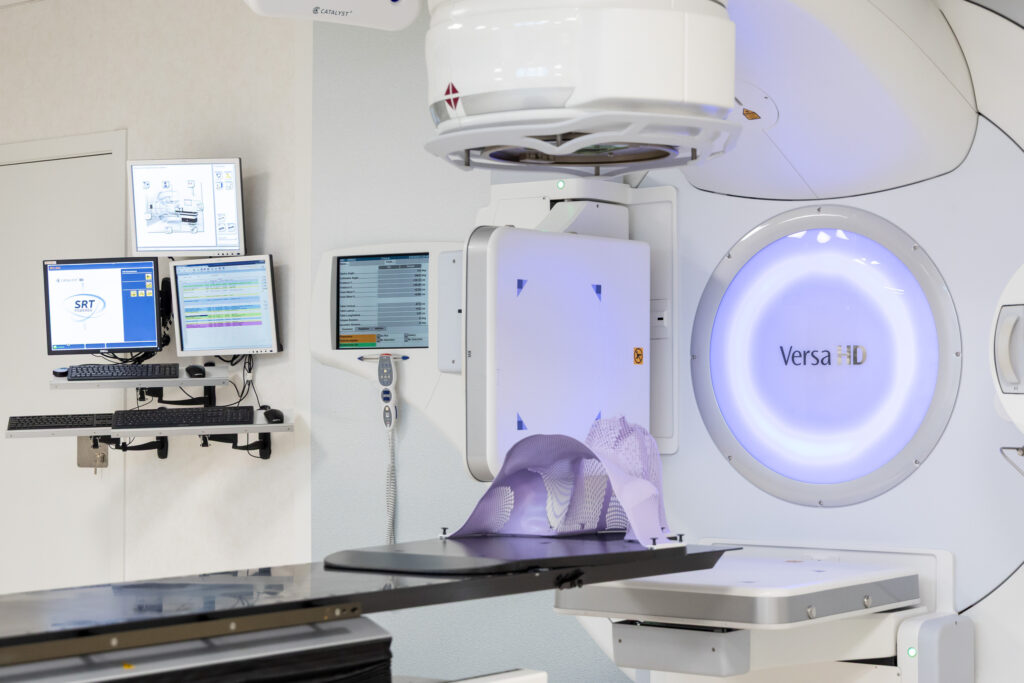Adaptive Radiotherapy
What is adaptive radiotherapy?
Adaptive radiotherapy is an advanced cancer treatment technique that uses real-time imaging to adjust the radiation dose during each session. This approach allows the treatment to be adapted to the patient’s anatomical changes (such as variations in tumor size or organ movements) with the aim of maximizing treatment efficacy and minimizing side effects on surrounding healthy tissues.
Thanks to innovative systems like Ethos™, developed by Varian, adaptive radiotherapy has evolved towards a more personalized and dynamic approach. Ethos™ combines artificial intelligence (AI) and advanced imaging technology to provide data-driven treatment in real-time, allowing doctors to make quick and precise decisions during each session.
What is this procedure for?
Adaptive radiotherapy is primarily used in:
- Treatment of solid tumors: Such as those located in the prostate, lung, head and neck, bladder, among others.
- Precision in complex anatomical areas: Allows treating tumors near critical organs with greater safety.
- Reduction of side effects: Minimizes the exposure of healthy tissues to radiation.
- Dynamic monitoring: Adjusts treatment according to changes in the patient’s body during the course of therapy.
- Treatment personalization: Thanks to technologies like Ethos™, the radiotherapy plan can be modified in real-time to adapt to the patient’s specific needs.
Benefits of high technology in adaptive radiotherapy
HM Hospitales leads radiotherapy with linear accelerators, an innovative technology that allows precise and personalized oncological treatments, minimizing side effects and improving patients’ quality of life. This millimeter precision directly attacks cancer cells, protecting healthy tissues, while personalized treatments optimize the dose for each patient. The Radiotherapy Oncology Service at HM CIOCC has high-precision linear accelerators for cranial and body radiosurgery, including the Varian Edge with Exactrac Dynamic and the Elekta Versa HD with 6D robotic couch and IGRT. HM Hospitales is a pioneer in incorporating Ethos technology, which uses artificial intelligence to adapt radiotherapy in real-time, and features Varian Medical Systems technology, offering advanced and effective treatments that allow for more effective treatments, with fewer sessions and a faster return to daily life for the patient.
With platforms like Ethos™, benefits include:
- Intelligent automation: Artificial intelligence helps automate the treatment planning and adjustment process, reducing the time needed to make modifications.
- Integrated imaging: High-quality images obtained before each session allow for evaluation of daily anatomical changes and adjustment of treatment accordingly.
- Patient-centered approach: Ethos™ is designed to offer a more comfortable and personalized experience, improving precision and reducing waiting times.
- Informed clinical decisions: Real-time data allows doctors to make evidence-based decisions during each session.


What is the procedure like?
The adaptive radiotherapy procedure involves:
-
Preparation:
In the initial consultation, the radiation oncologist will review your medical history and analyze the results of previous tests, such as biopsies, imaging studies, and molecular analyses. To design the initial radiotherapy plan, studies such as computed tomography (CT) or magnetic resonance imaging (MRI) will be performed. In some cases, internal or external markers will also be placed to locate the tumor with greater precision.
-
During the test:
Before each session, updated images of the area to be treated will be taken to ensure the precision of the procedure. With this data, the medical team can adjust the radiation distribution according to the anatomical changes detected. Radiation will be applied with advanced linear accelerators, ensuring precise treatment. Each session usually lasts between 15 and 30 minutes, depending on the complexity of the case.
With Ethos™, this process is optimized through the use of artificial intelligence, which automatically analyzes the obtained images and proposes adjustments to the treatment plan in a matter of minutes. This allows for quick and precise adaptation in each session.
-
After the test:
You will be regularly monitored to assess how you are responding to treatment and detect possible side effects. For this, you will undergo periodic tests, such as blood tests and imaging studies, which will help measure the effectiveness of radiotherapy. Then, you will review the results with your radiation oncologist, who will adjust your treatment plan if necessary.
Recommendations for the test
During the session, it is essential that you remain still to ensure the precision of the treatment. In addition, follow all instructions before, during, and after the procedure to ensure your safety and the effectiveness of the treatment.
Does it have any risks?
Adaptive radiotherapy is a safe procedure, but it can have side effects related to radiation exposure:
- Fatigue: Feeling of extreme tiredness during treatment.
- Skin irritation: Redness or sensitivity of the skin in the treated area.
- Local discomfort: Inflammation or discomfort in organs near the treated area.
- Specific side effects: Depending on the treated area, these may include difficulty swallowing, nausea, or changes in urinary function.
Thanks to technologies like Ethos™, the associated risks are further minimized, as the treatment constantly adapts to the patient’s anatomical changes, ensuring that radiation is directed exclusively to the affected tissue.
For your test to proceed smoothly, we ask that you arrive in advance of the indicated time. This will allow us to carry out the necessary administrative and clinical preparation.
Before the test, we will provide you with the Informed Consent, a document with important information that you must read and sign.
If your appointment is for a Magnetic Resonance Imaging (MRI), it is crucial that you inform us about the presence of pacemakers, metallic objects, prostheses (including dental ones), tattoos, or medication infusion devices, such as insulin pumps.
These diagnostic tests are very safe, but as with any medical procedure, there is a minimal possibility of incidence.